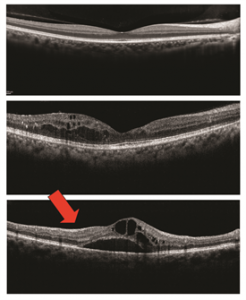What is Macular Edema?
The back of the eye, also known as the retina, consists of several different parts. The macula, which is one of those parts, is what helps you to see fine detail, faraway objects, and color. Macular edema occurs when an abnormal bubble of fluid accumulates in the layers of the macula, which is usually from the leakage of abnormal blood vessels. The American Society of Retina Specialists compare this to a droplet of water on your computer screen, which would cause the image to be distorted.

The middle photo shows some swelling, known as macula edema. The bottom photo shows macula edema involving the fovea, which absolutely requires treatment.
As swelling in the macula worsens, patients often complain of visual disturbances including distortion, blurry vision, and difficulty reading. If these symptoms are ignored and you don’t seek treatment, you may be left with permanent damage to the macula, with irreversible vision loss.
What causes Macular Edema?
Macular edema is not actually a disease, but the result of a variety of other conditions. Some of these underlying causes are:
- Metabolic conditions such as diabetes
- Blood vessel diseases such as vein occlusion
- Aging and macular degeneration
- Hereditary diseases such as retinitis pigmentosa
- Traction on the macula
- Inflammatory conditions
- Toxicity
- Neoplastic conditions such as eye tumors
- Trauma
- Surgical causes
- Unknown (idiopathic) causes
Diagnostic Testing and Treatment
The two most widely used tests to evaluate macular edema are fluorescein angiography (FA) and optical coherence tomography (OCT). These can help to determine if the swelling is diffuse, localized, or in many small blister-like areas.
The best way to treat macular edema is to treat the underlying cause, which may require eye drops, laser treatment, surgery, or most commonly, intravitreal injections (IVI). The IVI is done in the office, and generally causes minimal pain. Treatment does require very close monitoring by a retina specialist, which is what we’re here for!
DON’T WAIT! Call (716) 839-9009 to schedule an appointment with Saralyn Notaro Rietz, your Back of the Eye MD! She has over 20 years experience diagnosing and treating diseases of the retina.
References:
https://www.asrs.org/patients/retinal-diseases/20/macular-edema






